The astonishing spectacle of accelerating polarisations continues to be rich with truthful pickings. There is so much to take in. Some individuals seem to have welded themselves interminably shut. Others are cracking open. There is too much time alone and too little contact with others. There is excessive self-reflection and extravagant distraction. So many opposites within and without. As I negotiate my own delicate balancing act, I have been considering carefully what it means to have an open mind.
Closed mindedness inclines itself towards two expressions:
I know
I don’t want to know
In both of these dismissive variants, the mind serves to keep things safe by keeping things the same. It acts to defend itself from the possibility that real questions will lead to real answers, and that real change will then be required. It ensures that the transformational power of truth is kept at bay.
"Before destruction the heart of a man is haughty,
And before honour is humility.
He who answers a matter before he hears it,
It is folly and shame to him."
Prov 18: 12-13

The closed mind knows nothing but its own false boundaries. It chooses to defend the familiar confines of the fallen self. In doing this, it shuts the door to truth and becomes instead a ‘keeper of dogma’ (thank you NK). It cannot see, nor can it be receptive to reality.
"Woe to those who are wise in their own eyes, And prudent in their own sight!" Isaiah 5:21
In contrast, the open mind takes the following stance:
I don’t know
I want to know
The open mind is willing to accept that it is wrong. This mind is not ‘made up’, and with grace and patience, it may observe itself. It will inevitably begin to uncover its own brokenness, ignorance and insufficiency. The more it knows, the more it becomes aware of what it doesn’t know. To keep seeking the truth, the mind has to open itself continually into the vulnerability of the unknown. It has to trust that it will be guided.
In choosing a posture of openness, we are led to our own fallibility. We are asked to identify where we really are and how far we have descended. We are asked to acknowledge how great our fall has been. From the lowliness of our true position, unreality empties out of us so that we can be filled with the reality of Spirit. This is the gift of cleansing humility. From here, we may know.
"Humble yourselves in the sight of the Lord, and He will lift you up."
James 4:10
